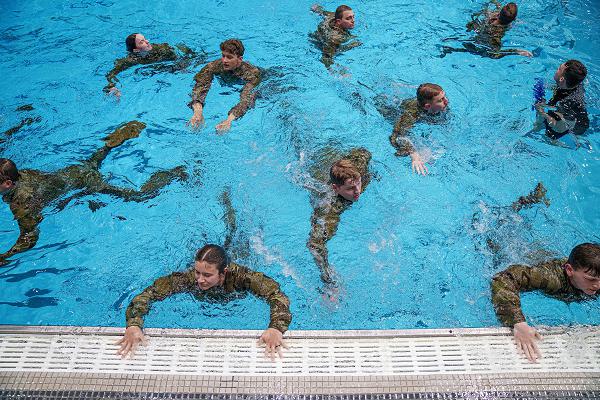
Fayetteville, Arkansas. (December 30, 2024): Life for most college students revolves around dating, partying, and a carefree existence. To others, however, college life also involves structure, physical fitness, and discipline. In this photo by Cadet Alexander Chrisco, University of Arkansas Army ROTC cadets complete a water survival training event. These cadets are full time college students who also participate in the military’s Reserve Officer Training Program (ROTC) in the hopes of one day becoming a commissioned officer. Unlike their compatriots, these students participate in military training, physical conditioning, and leadership development in addition to their academic coursework.
Each military branch offers four-year ROTC scholarships to eligible students at more than 1,700 U.S. colleges across the country. The Army ROTC is composed of eight brigades which command 273 units of 20,000 cadets at any given time. The selection criteria for Army ROTC scholarships includes SAT/ACT scores, academic achievement, and athletics. The Army also screens for leadership potential, high interview scores, and above average physical fitness. (For the eager beavers, there is also a Junior Reserve Officers' Training Corps at 1,600 high schools nationally).
Cadets get a chance to try out military life in the first two years without incurring any future service commitment. For their junior and senior year, cadets sign an agreement with the Army to serve on active duty, the National Guard, or the Army Reserve.
During their first two years, cadets study Army history, rank structures, drill and ceremony, and military courtesy. They also attend a 28-day Basic Camp at Fort Knox, Kentucky in the summer. At Basic, cadets practice basic first aid, learn rifle marksmanship, and how to toss hand grenades. They also learn land navigation, radio operations, and rappelling.
Third year cadets practice executing small-unit tactics and undergo intense physical training leading up to the four-week Cadet Leader Course. This advanced course focuses on various leadership roles cadets are likely to assume and they are evaluated on their performance in those positions. Cadets also participate in adventure training including negotiating obstacle courses, practicing water safety, weapons firing, and patrolling.
Upon graduation, cadets owe Uncle Sam a commitment of eight years’ service in either active-duty or reserve status. Because of their willingness to serve, ROTC cadets are a different kind of college student.


